I do, you do, we do, the power of distributed responsibility, and other lessons from Writer MBA Con 2025
We spent 2 years building a conference, making this the most expensive article I have ever written.
Hi,
I’m starting this article sitting in my new Hello Kitty bathrobe on the day I leave our first full conference to fly back to Los Angeles, and people have already been asking me about what I learned and when we will do it again.
So, I’ll first say that we have no date for the next event, but we also aren’t saying this event will never happen again. It was very, very, very tough and the expense made it so that whenever anything went wrong, we had to turn back to it, even if we were planning other launches.
Our businesses are so much more than this event, and yet all our resources are brought to bear on this event only. It’s a lot of energy expended for 1/52 of the year. That said, I had most amazing time, and honestly this was exactly what I envisioned when I set out to make a show. We did not compromise at all (though maybe we should have).
So, here is a bunch of lessons and pictures and awesomeness.
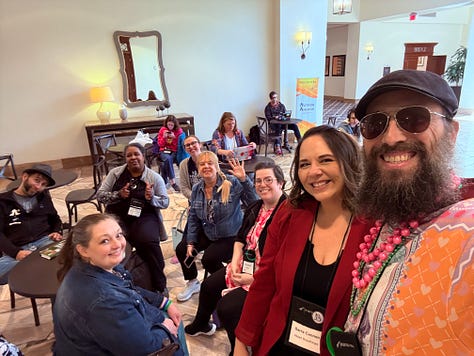
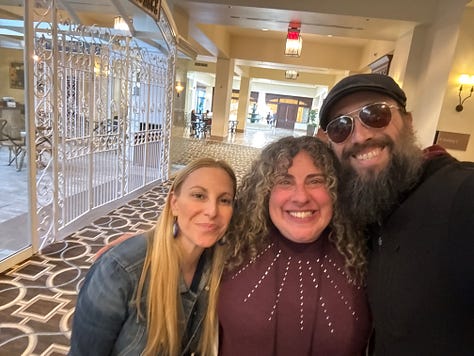
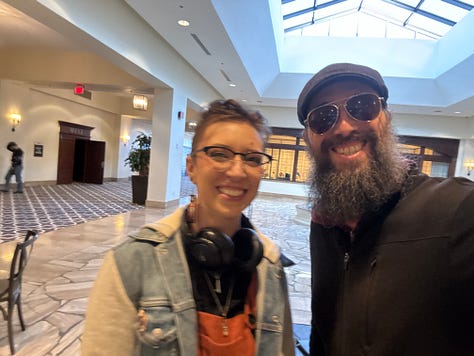
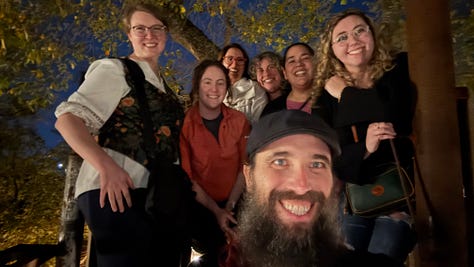
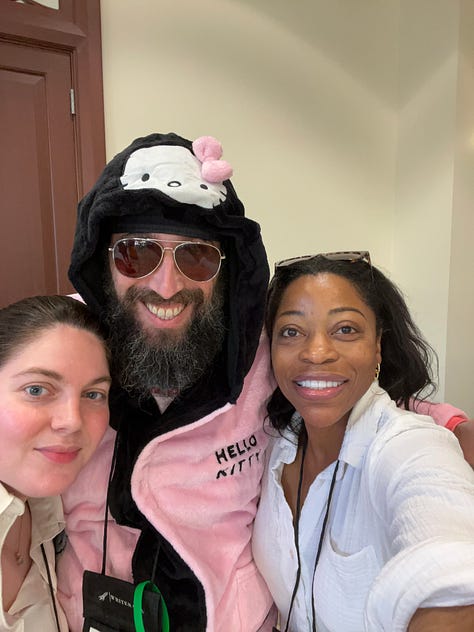
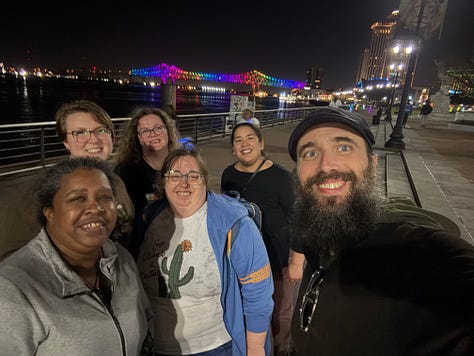
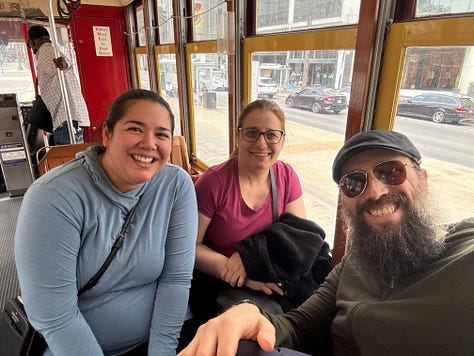
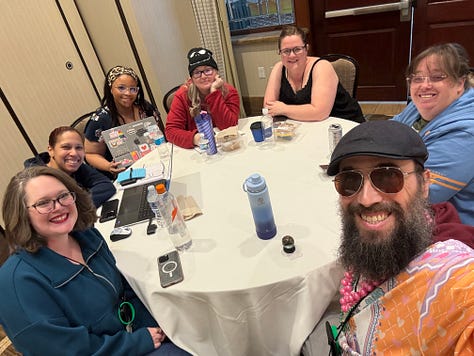
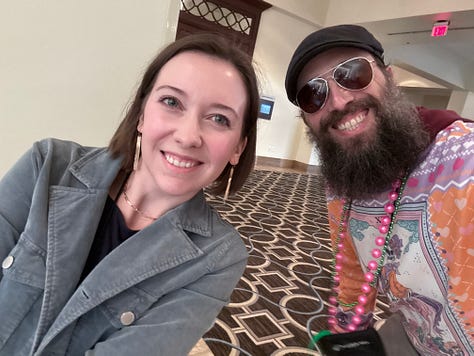
This the furthest I’ve ever gone to prove a point. I have been going to events for 15 years, and in all that time the best experiences have been about connection over information. I almost never went to sessions, choosing instead to hang out and mingle outside. I always felt like I was breaking the rules by choosing to talk to people instead of get talked at, and in talking to many people they felt the same way. I have tried to tell organizers that they should focus more on connection over information, and this conference made it clear that there is a strong contingent of people who would rather talk through their problems with other people than be talked at for three days. You can build a conference around connection instead of information and make it as impactful, if not more impactful, as one built around information.
If you want to create something new, it will be infinitely harder than building on something that already works, but you also get unlimited arbitrage, because nobody else will be willing to even try it. If Monica and I set out to build something that people had seen before, and could easily conceptualize, then pitching it would have been much easier. Everyone knows what to expect from a conference built around information. We would have focused on getting the flashiest names and designing things that you’ve seen 100 times before. Instead, we decided to rethink everything about conferences from the ground up, and as such it was damn near impossible to pitch this thing for the last two years. We had to basically say “Trust us”, which is not the best way to get people to part with their money. However, now that we’ve done it, and people see it, they know there’s nothing else like it, and there won’t likely be anything like it any time soon, which means we can (probably) charge top dollar to people who want that experience, instead of other conferences that feel like everything else. The fewer people you compete with directly, the more unique your experience, which means fewer people want it, but those that do can’t get it anywhere else. It’s very hard to convince people to trust you, but those that do can be changed forever by the experience.
Engagement does not equal connection. Honestly, I get very few reactions or comments online, especially compared to my friends, so to hear how many people listen to every podcast and read every article even if they don’t publicly talk about it, was wild to me. These people flew to New Orleans, most of them, or drove there, and told me over and over again how much my work meant to them. Writers are a solitary and quiet bunch, but that doesn’t means they aren’t moved by the work, even if they don’t say it. This has always been true about my work, but it’s hard to remember it in the quiet of the internet, but engagement does not equal connection, and it certainly doesn’t equate to money. Most people connect with you through the work, not about or around it. It also doesn’t mean you are bad at community if you are bad at engagement. We’ve curated an incredible community of thoughtful humans who had transformative experiences at the show, even though they don’t comment online.
We are a counterculture conference, and a counterculture community. The great thing about our conference is that it brought together people who were having success doing things against the orthodoxy. These were anti-hustle culture, and AI positive, and alternative income stream heavy creators who were not only tolerant but excited by doing things in interesting and unexpected ways. People told me again and again how much they loved that everyone was doing things differently, and that we weren’t rehashing the same topics other conferences recycled every year. You can do things really differently and not only succeed, but thrive. That might have not always been true about the publishing industry, but it is true now.
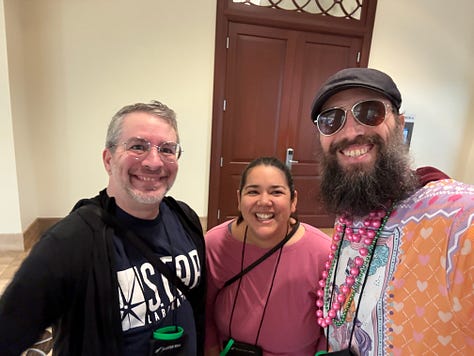
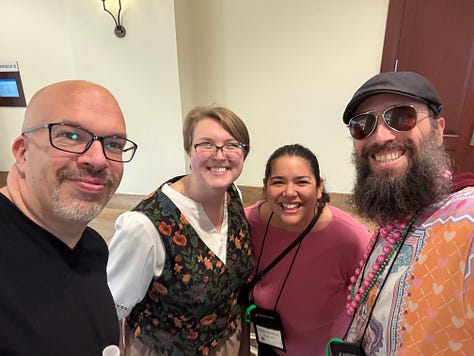
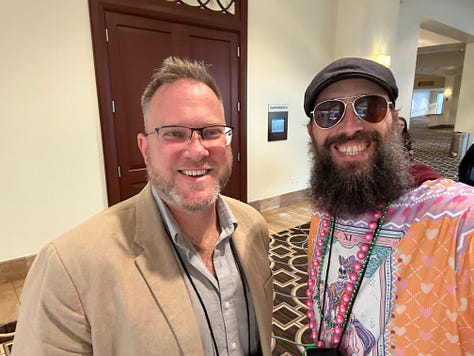
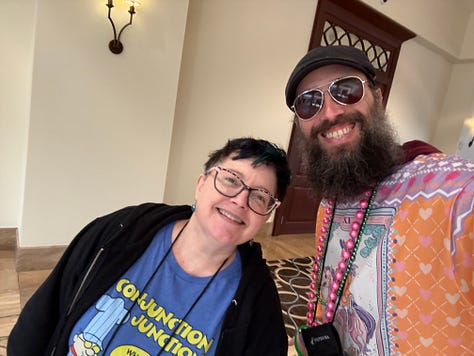
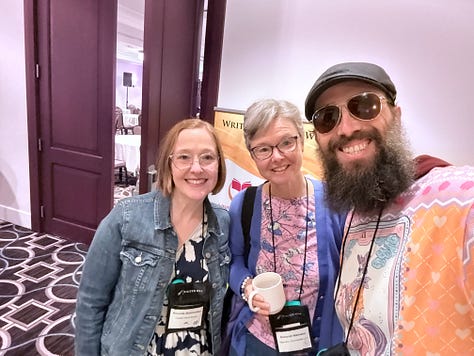
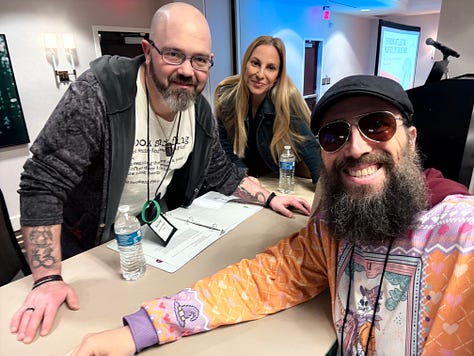
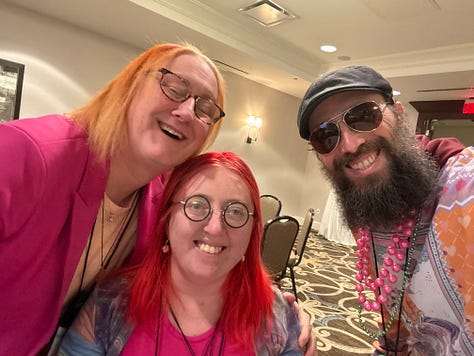
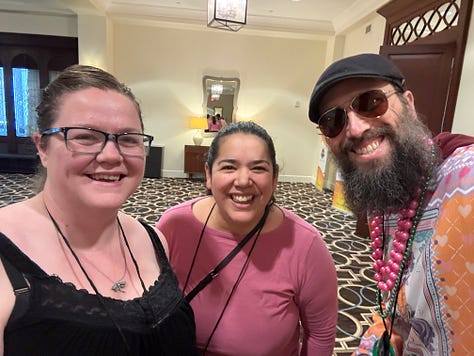
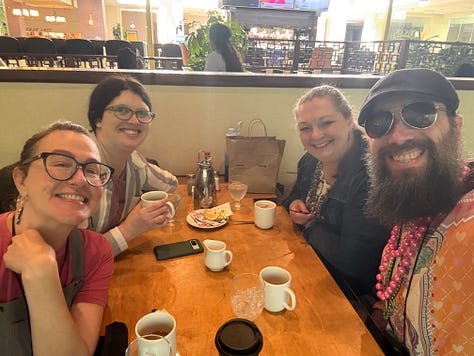
If you want to grow, it comes down to keys and locks. People come to a conference with two main things. The first are the locks that are blocking them from advancing in their careers. I think conferences are very good at talking about locks, but they are terrible about talking about the other thing that all authors come to a conference with in spades. Namely, keys to open other people’s locks. No, your key doesn’t work to open this lock, but it did work to open an old lock, and it can work to open other people’s locks, too. Maybe organizers don’t want to give you this kind of power, but every one of you has keys that can be used to open other people’s locks. Instead of being laser focused on our own locks, if we instead focused on connecting people with locks to the people with the right keys, we would all be able to open our own locks much more easily and quickly than when we focus only on our own locks. It takes thinking outside ourselves a little bit, but the return on that investment is exponential. We had people blasting through 5-10 locks during our event, and leaving energized, where usually they would struggle to find one. The responsibility for breaking blocks is a community problem that can be exponentially reduced if it is distributed among the community.
When you lean into distributed responsibility, everyone feels empowered. Usually the responsibility for transformation falls mainly on the speakers, sponsors, and vendors, but when you distribute responsibility among the attendees, and teach them how to use their keys to open other people’s locks, it empowers everyone to feel like they have agency, which is bad if you want to concentrate wealth and make people dependent on you, but great if you want people to feel like they have agency to change their situation.
You can leave a conference energized instead of overwhelmed. Continuing on with the above point, if you focus on connection over information, and all work toward opening each other’s locks, you can leave energized from a conference instead of overwhelmed by it. The best thing I heard once people left was that they felt like they had a plan and were energized to implement it, where they usually felt overwhelmed by shows.
30 minute breaks between talks are a wonderful thing. We normally see 10 minute breaks between panels, and really they almost always go long so most people are rushing between talks. If you give people 30 minutes to reset and readjust, they can run back to their room to recover, talk amongst themselves, ask follow-ups to the speakers, and even journal about what they learned so they can better synthesize and absorb their key insights. If they can do that, then they can plan for the next step instead of always playing off their back foot. One of the best things I heard from our audience was that they didn’t feel the need to stay out late connecting with people because they had a chance to make connections during the day.
You set the level of vulnerability for your audience. In her talk, Heather Hildenbrand spoke about how she is responsible for setting the vulnerability levels of her audience, and something clicked for me. It’s something I had never vocalized but always felt. I am always willing to dig up deep wells of vulnerability in my talks, but I never really connected it with setting the pace for where other people are willing to go, but yes. Nobody will go deeper than you, and that deepness is one of the keys to connection. However, the talks are just the beginning. If you really want to faciliate vulnerability, you need to create a safe space with intention and give people lots of ways to indicate their comfort level. We gave people green and red wristband they could use to indicate what they are feeling. I mostly only saw green, which meant people were open to connection, but just having the option to put on the red ones increased the vulnerability level of everything and everyone. We also created quiet spaces to recover and the ability to hide without feeling bad about it. Many people said that by having the organizers walk around outside the panels, they felt that they could do the same, even leaving the event all together to have adventures instead of attending every talk. All that made them more willing to be vulnerable in those moments they are present
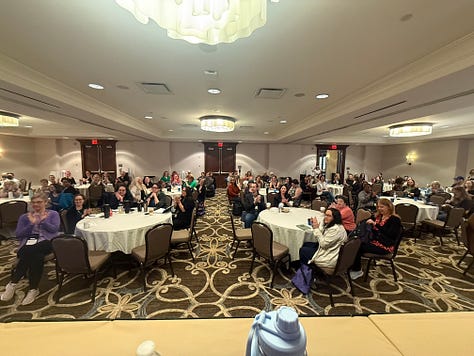
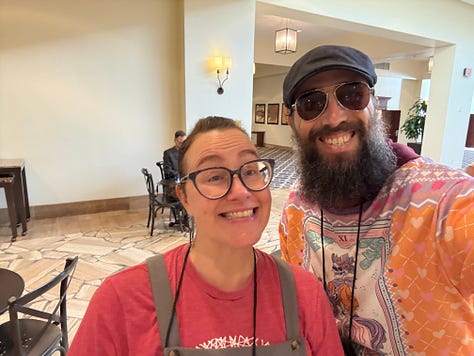
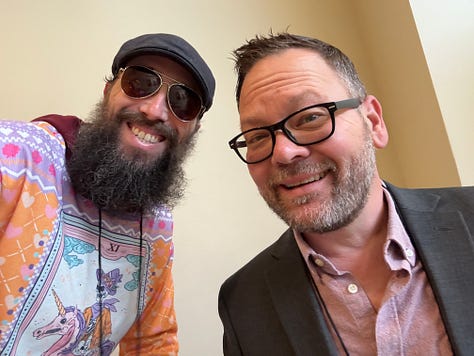
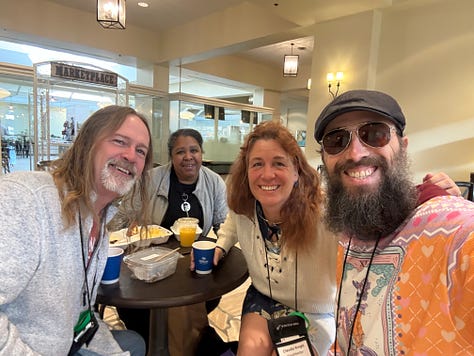
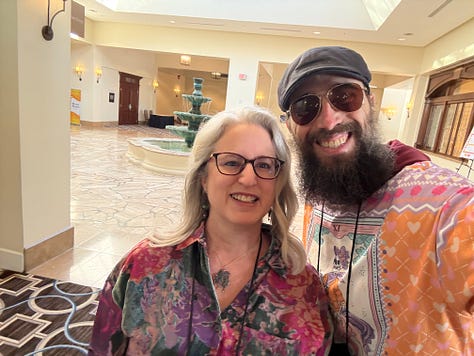
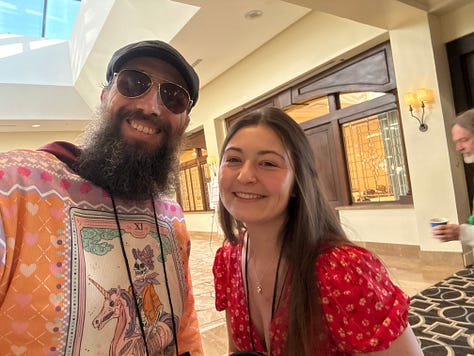
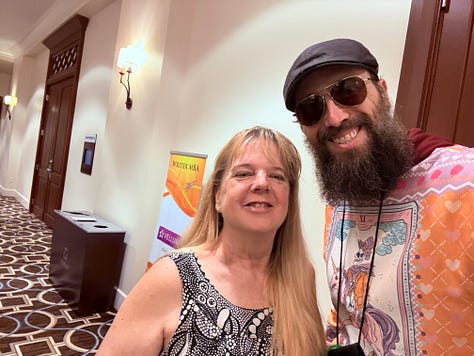
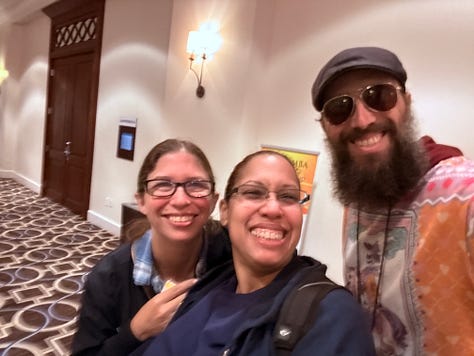
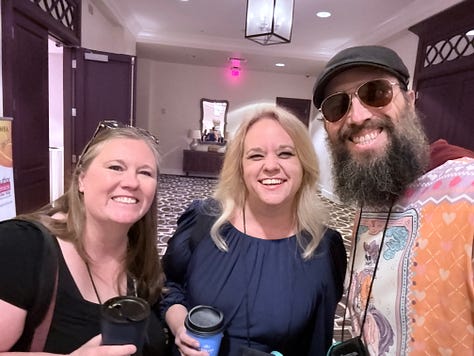
I do, you do, we do.
taught me that the key to education is the mix of I do, like a book, you do, like a workbook, and we do, like a conference. When you have that mix, then people can exponentially increase their transformation.Easeful, not easy. One of the biggest keys to me was expressing the difference between easeful and easy. When things are easy they lack difficulty, but when they are easeful, they are without friction. Most people don’t want things to be easy. They want things to be easeful. When they say “Why is this so hard?” they almost always mean “Why is there so much friction getting where I want to go?”
In chaotic times, creation is an act of rebellion. The universe defaults to chaos and destruction, so the times we live in are just the universe acting as intended. It is a feature of the system, not a flaw. Creation is the act of bringing some semblence of order and beauty to that chaos, and that itself is an act of rebellion. The universe will fight against creation, because it fights against order, but the meaning is there if we search for it.
I wish for you the audacity of somebody that has never known pain or rejection, and the empathy of one who has felt too much. That was the last thing I imparted during my opening keynote at the mastermind, and I am really proud of this idea. I think great art comes from this contradiction, which is why being a creator is so hard. It takes both great audacity and great empathy to make something, and it’s almost impossible to embrace both of them at once. Most people overindex on one or the other, depending on their past trauma, but if you can find the strength to do both, that is where true art lies.
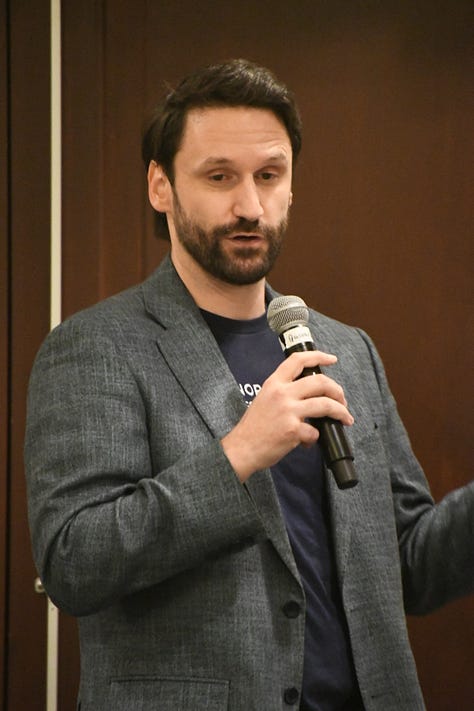
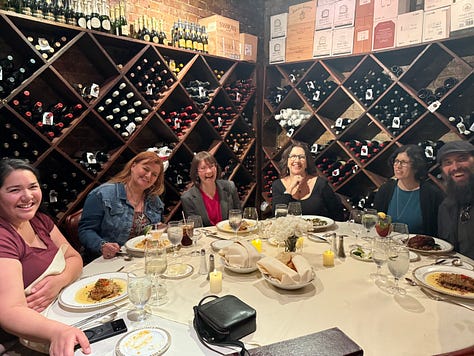
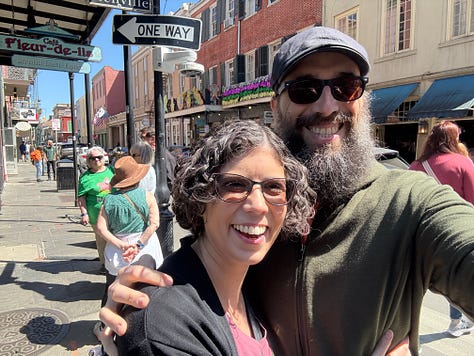
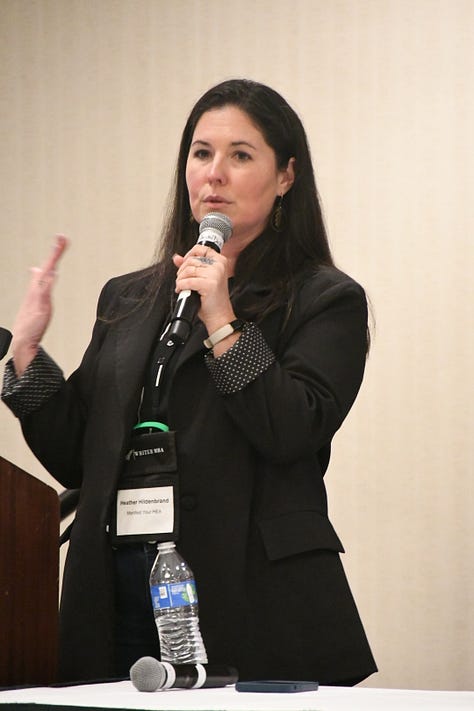
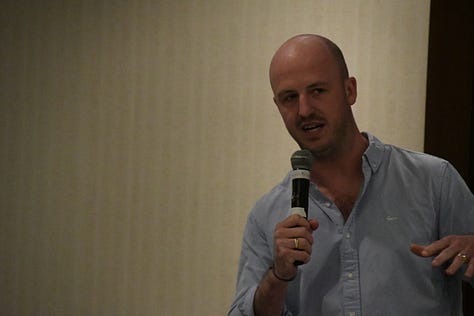
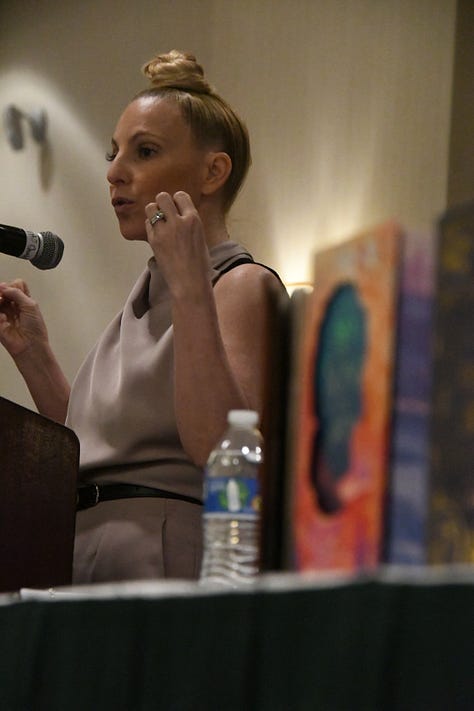
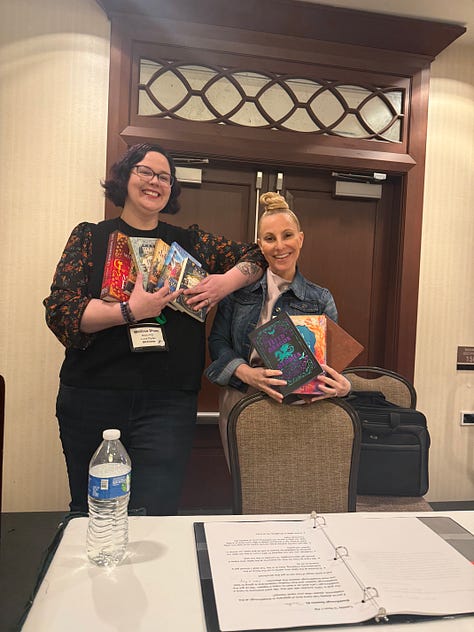
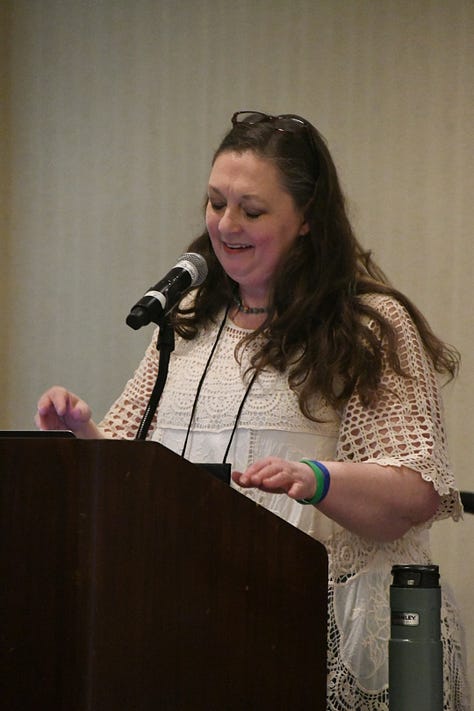
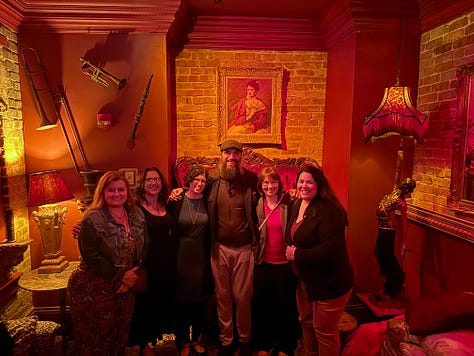
Feral chaos and planned serendipity make cons more fun. My words for this year are feral chaos, and a conference is that on steroids. The best way to enjoy a convention is to set some intentions, choose the right one for you, and then just allow the universe to guide you to what you need to find. In travel, this is called planned serendipity, and I use it as a guiding principle for my whole life. I said above that the universe defaults to chaos, but it is up to us to decide whether that chaose leads to creation or destruction. Most people fight the universe, but it will give you what you need if you let it, but you need to set some guidelines first so you know when you find something worth exploring.
Cons should encourage you to have fun little adventures outside the con, instead of making you feel bad for not attending every session. I watched people come back from lunch many days with shopping bags, or wearing new clothes, or having just done something outside the conference, and I love that the city can become a character in your conference if you let it. Really, I think conferences should be more experiential, and that having adventures outside the conference are how you really bond and connect with each other. Even though I owned the conference, I was able to lead adventures to a tarot shop, the French Market, getting to ride a streetcar, going on a carriage ride, tracking down awesome ice cream, and more. In six months, those are the things I’ll bet people talk about as much as the transformations.
Vendors are a value add to every event. We never understood why even conference directors had such hostility to the vendors at their events. In my experience, vendors were the reason I was so successful, not a hinderance to that success. We are very hard on vendors when they want to work with us and vet them pretty strictly to make sure they will be a value to our audience. It meant saying no to lots of vendors, which is tough because of money, but it meant that we could enthusiastically tell people to meet and work with every vendor…and both the attendees and vendors loved it. Attendees told us that they loved not people pitched at, and vendors loved that they could have real conversations with people without feeling like they are invading a party they weren’t invited to, which is the worst. Everyone at your conference should be additive to the experience. If you don’t believe they will be, then you probably shouldn’t bring them to the conference, no matter how much they pay you. If you do believe that, then you should actively try to make as many connections as possible between them, as it’s the best way to make everyone more money and have more success, which is the point.
My body did not like this week, even if my mind did. With Long COVID, it’s hard to do anything at a sustained level, and I’ve been swallowing extra pills to get through this, but after looking over my metrics, it’s clear this was the worst week for my body in a long while. This was brutal, and it will take weeks, if not months, to recover from it. That doesn’t make it bad, per se, but when we started this adventure my body was in much different shape than it is now. When I finally got home, my wife said “You’re safe now, body”, and I slept a good sleep for the first time in a month.
If you want to light money on fire, create a conference. If you want to make money, do literally anything else. People have already been asking us whether it was worth it, to which I say that I will go to any length to prove a point, but even this was crossing the line for me. We spent two years of our lives on this event. While the first year we had slightly positive cashflow, this year we were deeply in the red. To be fair, most of that is the share of revenue we should have made but didn’t, so the last two years were largely a wash if you discount our share of the proceeds. That said, I don’t think anyone should work for free, even me. I’m happy to eat last, but I do want to eat, and I want that meal to nourish me. Additionally, since starting this conference I have been paid less by Writer MBA than I currently have in debt because of this company. Nearly every bit of money we made, which was a lot, went into this conference for the last two years. So, I can’t say that spending two years of my life to lose money was worth it. I do think it has done things to my career I couldn’t even imagine two years ago, and shot me forward in a way that would have been impossible without it, but being in the red is a really tough pill to swallow, especially when I have often felt like a burden to my family. I love the transformations we facilliated and the lives we changed, but meanwhile my family suffered for it, and so did my mental health. It’s hard to say that any single week could be worth that in the end. We both knew this conference would take 3-5 years to turn a profit, and if we could do it again and guarantee we would be profitable next year, I would likely do it, but profitable definitely also means paying us for our time and energy and probably means repaying us for our efforts up to this point. Currently that exchange is wildly out of kilter.
While there were 180 people that registered for the show, far fewer of them came for the conference. Because we had a few modular events (like our mastermind and Sarra Cannon’s Heartiecon), along with sponsors and vendors, almost everyone came to New Orleans for one of those satelite event instead of just the conference. When you filter out the people at the mastermind, the people who came for Heartiecon, sponsors, vendors, staff, and the comp tickets for subject matter experts (SMEs), only 19 people actually paid for the conference by itself. That’s barely 10% of the total attendees, which is yikes. On top of that, the number of people who came to the mastermind didn’t markedly increase from 2024 to 2025. These are troubling signs. Yes, we ended up significantly increasing our sponsorship and vendor revenue between shows, but without Heartiecon, the mastermind, and our SME outreach, we would have basically had nobody at the conference, even as I grew this publication to close to 50,000 people, including over 1,000 paying members, which is a huge problem. It’s one thing to have a very small audience and get little traction, but having a large audience and getting such little uptake is worrisome. Do I really need a 250,000 person audience to make this event work? That seems impossible based on the size of every other newsletter in the industry. When people ask why we are hesitant about doing a 2026 event, I look at those kinds of numbers and have no confidence in signing on for another $200k contract commitment.
I have honestly no idea what to do now. I’ve done a lot in my career, and the things I enjoy the most return the least pretty consistently. It’s not that they return no money, but they return the least per dollar and ounce of effort. Writing portal fantasy books pays way less than writing non-fiction, and writing this blog pays way less than consulting and making courses. All of that pays better than running a conference, which I enjoy the most, but make the least from in the end. I feel like this is a time to have a hard reset on just my whole life, as most of my obligation either are done or will be done in the next couple of weeks. Then, I’m going on low power mode for a while to try to figure this stuff out. I have half of several plans, but they all feel incomplete, and only spark partial joy. I have basically been putting my life on hold until this conference was over, and thought I would have some sort of grand vision once I was through it, but instead I have nothing more concrete then I did two months ago and very little more concrete than I did two years ago.
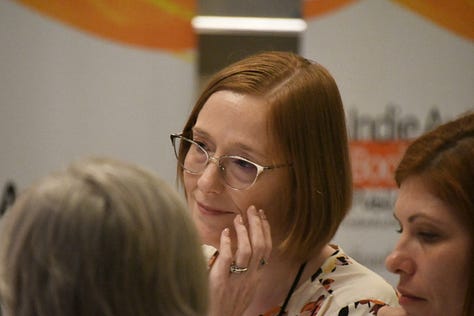
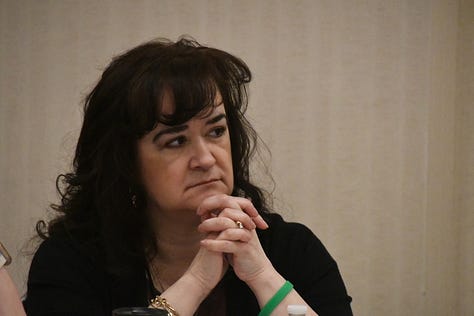
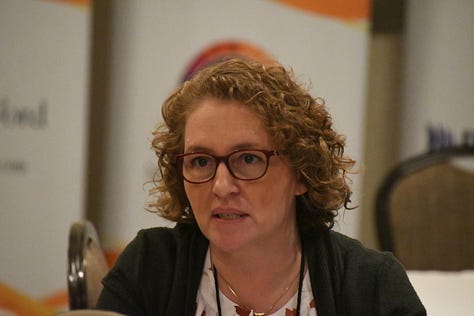
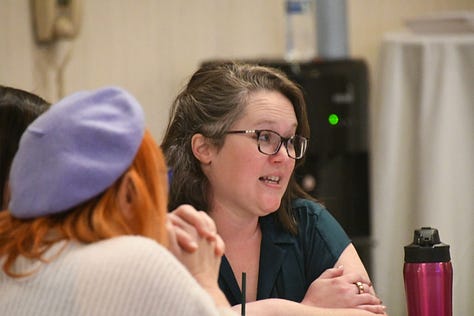
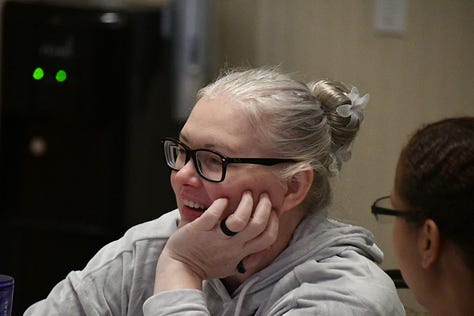
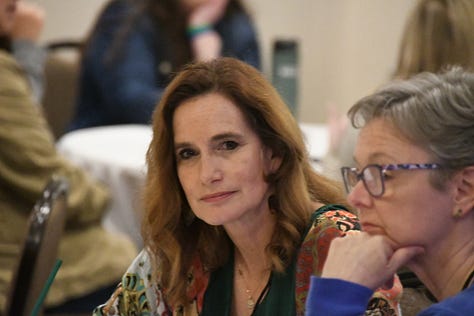
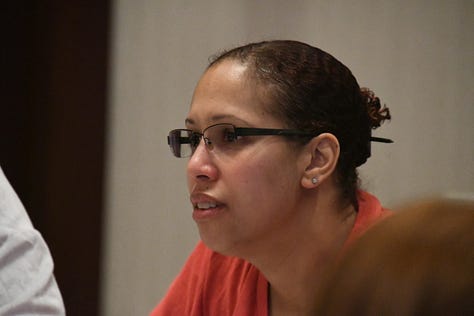
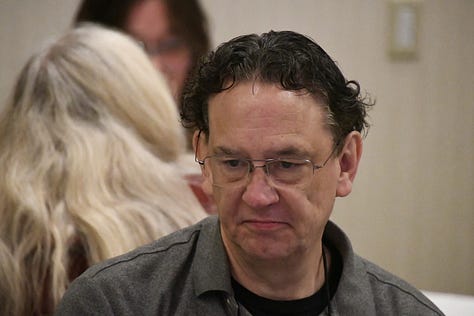
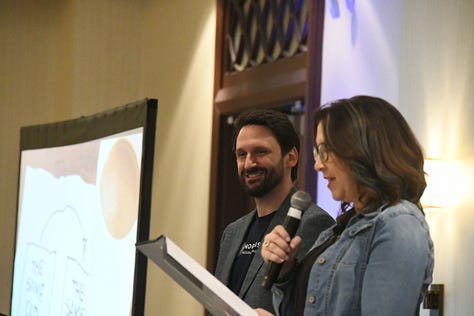
So, what does this all mean? I’m not sure I know, or that I’m supposed to know, but I do know that everything we’ve been preaching for years about how conference should operate worked exactly as we thought they would. Still, even knowing we were right, it’s hard to commit to doing it ever again or take much solace in it.
Like attending a conference, I suspect the knockdown effects won’t be seen for 3-6 months at least, and that’s okay. When you leave a conference, you should have a decent plan, but enough wiggle room to take advantage of unexpected things that pop up and random connections that you didn’t know would be valuable.
It does bring up a question I’ve been running through my head for a long time. Am I a writer, or an experience curator?
It sounds like the kind of question designed to make me nauseous just reading it, but honestly, in 2025, it’s a valid and necessary question to ponder.
Over the past few years, I’ve been navigating some heavy feelings, especially as AI becomes a bigger part of my creative process, my health has taken a lot of my energy away from me, and I’ve expanded beyond just writing books into building courses, hosting conferences, and creating RPGs and card games.
So what place do I really have in this evolving landscape if I’m not the one physically making every piece of content in my universe? That question, and talking to so many people about it, led me to the realization that James Patterson isn’t really a writer anymore. He’s an expectation. So are Janet Evanovich, Anne Rice, and Nora Roberts. So is Rick Riordan. That’s why he can present something under his name and people will buy it.
Because fans aren’t just buying his books. They’re buying the promise of a curated experience he delivers, over and over again. And that’s when I started to realize I might not be a writer anymore, and maybe I never have been. Maybe this whole time I've been an experience curator.
What does that even mean? To me, an experience curator is someone who ensures that, no matter the format—book, event, product, or post—the end result delivers on the emotional promise the audience expects. You're the guiding hand behind the magic, even if you're not building every piece of it yourself.
When we write a new book, even in a beloved universe, readers don’t know if they’ll like it. What they do have is trust you'll deliver. That’s everything.
It’s very different from going to your favorite restaurant. There, you know exactly what to expect. But for writers, we’re always making something new. Every book, every product, is a leap of faith. For us, that leap is almost always a book, but that same relationship exists whether it's an anthology you edited, an RPG you guided, or a card game built in your world.
They’re all different, but they’re cut from the same cloth of trust. The audience is betting on you to deliver.
Sure, if you write in the same universe as your biggest hit, the trust comes easier, but it still has to be earned with every installment.
You’re promising not to muck it up. Even then, sometimes you do muck it up, and then the audience turns on you.
Releasing something is as much an act of curation as it is creation. Often, the curation is part of the creation, but it doesn’t have to be. Curation can mean hiring well. It can mean supervising other people's brilliance and making sure it aligns with the experience your audience expects from you.
Now, I get that some people—especially those steeped in the traditional view of authorship—might bristle at this idea. This doesn’t mean writing is obsolete, or that craftsmanship doesn’t matter. It means the role of a writer, in today’s landscape, is bigger. More layered. More collaborative.
And it always has been, but we've historically had the presumption of trust, as long as we stayed in our lane.
Now, those lanes have been blown up.
What people want hasn't changed, though. They want to know that you, the trusted creative force, signed off on what carries your name. That could be a comic, or an RPG, an AI-generated film, a YouTube channel, or whatever you decide to make. It means more freedom, but also more responsibility.
I’ve worked across so many mediums, and I think one reason I’ve been able to find success in all most of them is that my audience trusts me. They know I’ll deliver or die trying. That I’ll be a good steward of their money. That I’ll curate an experience worth their time, and that matters more than the medium itself.
They don't trust blindly, but they can look back and see that I've done a whole lot and delivered for them in the past, so they can trust more liberally with me than most creators that don't have the breadth of my experience. I have delivered, which makes it infinitely more likely than I will deliver again, and that is everything.
This is where most AI bots and content farms fail. Because success doesn’t come from the sheer volume of content, it comes from trust. From a community of people who believe you are curating the right experience for them.
So how do you build that kind of trust?
In my experience, it comes down to three things: consistency, transparency, and delivery. Show up regularly. Be honest about what something is (and what it isn’t). And then follow through on your promise.
Once someone believes that they’ll be more likely to follow you anywhere.
The hardest part is getting past the initial “Just trust me once.” But if you deliver, whether it’s a $5 ebook or a $5,000 event, they’ll trust you again. And again. Because most people can’t deliver even once, let alone consistently.
A billion bots making a trillion books can’t replicate that. They're playing arbitrage games with today’s attention, not building relationships.
Sure, maybe you can make a billion dollars making a trillion books, but that’s a lot of work, and it’s all short-term. Those readers won’t stick around and then you’ll be vapor.
Or… you can focus on being a curator of taste for your audience. Knowing that sometimes, your role is just to vet the work, to stand behind it with conviction and say: “Yes, I believe this is something my audience will love.”
And be right, because that's key. If you curate an experience, you had better be right that your audience will love it.
It might be a newsletter swap. Or a guest interview. Or a new line of business entirely. But the core truth remains the same. Nobody trusts you at first, but once you deliver, they’ll trust you until you prove untrustworthy.
Writers often get caught up in needing to write every word or touch every detail, but do typists get writing credit for typing a book? If not, then how essential is it that you physically touch every piece of the process to still be considered the author?
Letting go of that control can be freeing.
It doesn’t mean losing your voice, it means trusting your ecosystem, your collaborators, and your instincts. That’s not less creative. It’s more sustainable.
Almost all the attendees who came to New Orleans in the past two years had read our work before coming, sure, but the event itself? It wasn’t based on anything we’d written. It was something brand new. A completely different format and experience, even than a virtual conference.
Yes, showing up to one of my free or cheap virtual conferences, or hanging out on one of our monthly calls, can give you a taste of what it might be like, but it’s not the same as dropping thousands to come to a conference in person. We didn’t have proof it would be good, but what we did have were principles, and an audience we served, which gave them faith in us. We let that guide us in creating something we believed they would love.
That conference, on the high end, cost 100x more than one of our books. And yet… people came. And now they’re asking when we’ll do it again, because they want to give us more money to curate another experience.
They trusted us to deliver, even though they had no idea what it would look like. Even though we hadn’t done anything quite like it before. Even though we didn’t know what the experience would be, they trusted us and we trusted us.
That trust? That’s the magic. It's the only bit AI can't replicate. They can spam and spoof and replicate, but they can't build trust in our audience. Only we can do that.
As writers, that’s what people give us every time they pick up our work. They’re trusting us to deliver an experience they’ll love, even if they can’t articulate what that experience is yet.
In that world, it doesn’t really matter if you write with AI, because it’s still being edited and curated by your eyes and through your experience. Every piece of AI writing that goes out into the world will sound like you because it will be approved by you to be experienced by your audience. You wouldn’t let it out unless you thought they would love it, and if you would then you don’t deserve the trust of your audience.
I’m not telling you what you should or shouldn’t do, but I am saying I think we’re having the wrong conversation. You are not in service to typing words on a page. You are in service to your audience and delivering them an amazing experience they will love. You are in service to the trust that you’ve built with them, and that trust will be different for every author.
That should open up so many possibilities for us. And give us real security in our work.
Because as long as we curate well—and are good stewards of people’s time, money, and attention—they’ll keep investing in us.
Honestly, if you told me these 180 or so people would be the ones that joined me in New Orleans, most of which I didn’t know even a couple years ago, I’m not sure I would have believed you. To see how many vendors were in the room for instance, when almost none of them took me seriously a few years ago, would have blown my mind.
If you told me I would have gone from hosting an event for a couple dozen locals in a comic shop, to having a couple hundred people show up in a city where they had to fly into, again, I’m not sure I would have believed it.
And yet…
So if you don’t have enough readers right now, ask yourself this: How can I start building the kind of trust that makes people believe, without hesitation, that I’ll blow their minds and never make them feel like a fool for betting on me?
And how can I keep reearning that trust with every project?
What do you think? Let us know in the comments.
If you found this interesting, then there are over 850 exclusive posts available behind the paywall, including tons of interviews, courses, books, and more to help you on your author growth journey. You can start exploring with a seven-day trial, or even just give us one tip to show your support.


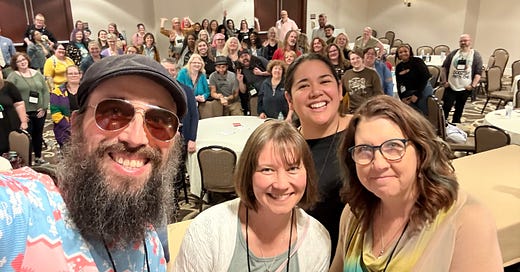



I'm an avid follower of your content, and as an event coordinator, I find THIS POST just so very, very valuable. Thank you for freely sharing this hard-earned advice and insight. I'm taking this to my design team immediately. Brilliant.
What can I even say?
I knew from the first time I heard about the idea behind it that WriterMBA was going to be unique and amazing. Even though my usual style is to be a fly on the wall, this conference managed to pull me out of my shell and connect me with a number of people who have really opened up the locks that have been holding me back.
And truthfully, seeing your transparency here about the financial and energetic realities of the conference makes me see it in a whole new light. What I can say without hesitation is if I had the means I would have been more than happy to pay 5-10x the ticket price for this experience.
Transformative is an excellent way to put it.
It was amazing to finally meet you and Monica and everyone else that made the conference incredible.